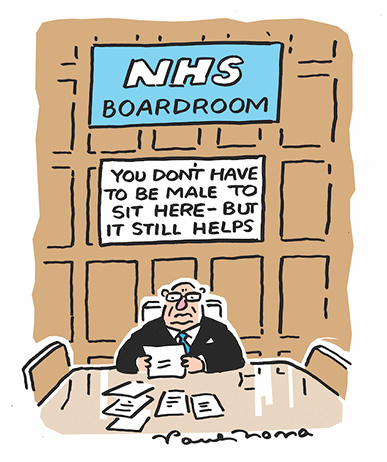How men can support women leaders
Here’s our tips on how men can play a big part in supporting women leaders and the push for a more gender-balanced NHS.

1. Men can make a difference
Men play a crucial role in ensuring women are represented and supported in leadership positions. Data shows that where men are actively involved in equality issues, 96% of their organisations report progress, compared to only 30% where men are not actively involved.
2. Sisters shouldn’t do it all for themselves
We need men, as leaders and colleagues, to understand the workplace barriers women face and be prepared to ask women how they can support them. We all have a role in ensuring the NHS working environment supports everyone to achieve their potential and that our leadership represents the communities we serve.
3. The system needs fixing – not the women
It’s easy to characterise the drive for equality as political correctness, or to see the moral case but not the urgency. Greater awareness of the business benefits of a diverse leadership team can help leaders to make the case for diversity in their organisations. And we need a greater sense of urgency because, in areas such as the gender pay gap, we’re actually slipping back.
4. Encourage different models of working
Women, who historically have often shouldered the burden of caring responsibilities, may not want to work in the way previous leaders have. Contributors to our Men as Allies report, published earlier this year, picked out accepting and supporting different models of work as something that would benefit both women and the growing number of men with caring responsibilities. But we all need to work hard to make this happen, as senior roles are often not constructed to enable flexible working.
5. Challenge assumptions
Women often have to battle assumptions about their leadership style and their ability both to do and commit to senior jobs. Male leaders need to be aware of the assumptions made about women in recruitment and promotion processes or the everyday working environment – and challenge their own assumptions too. Supported conversations that actively explore how such assumptions can be avoided could yield more women candidates for senior roles.
6. Support personal development
Coaching or mentoring can make a real difference for women who want to progress to new roles or challenges. As one interviewee for our report suggested, women sometimes have the insight to make changes as a leader but might need support to grow the courage or confidence to take risks and make changes happen.
7. Offer challenge
Refusing to accept all-male shortlists for senior jobs is one way to make a clear commitment to gender balance – but it’s important to avoid tokenism with this approach. Talking about diversity, challenging a ‘macho’ culture and role-modelling behaviours are other important ways men can help.
8. Support from leaders
Support for the aim of achieving gender balance on NHS boards by 2020 needs to be backed up by pressure from above. Holding the chair and chief executive to account for progress is one way forward. Organisations can also publish data about gender balance and progression, as they have done with the Workforce Race Equality Standard. More data will help us to identify the actions we need to take to achieve gender parity in the future.
9. Being an ally is more than just saying you’re one
Not all men will necessarily embrace or even understand the drive for gender balance. Some will feel threatened by it. One contributor to Men as Allies said: “Men sometimes held themselves back from getting involved in debates around gender equality because they fear being viewed as patronising or ‘getting it wrong.’” Dealing with the fear of losing power, being supplanted or seen as patronising may be difficult, but doing so constructively will boost the chance of meaningful change.
10. Get comfortable feeling uncomfortable
Challenging norms, assumptions and ingrained patterns of behaviour is uncomfortable. Giving space and time to other people in a competitive environment is an act of generosity. Speaking out and following your words with actions is brave. Women leaders do this on a daily basis. They already have brilliant male allies who are challenging, generous and brave, and are willing to get comfortable with being uncomfortable – but we want to see this as the norm. If you are not uncomfortable sometimes, then you won’t be making progress. .
Samantha Allen is chief executive of the Sussex Partnership NHS Foundation Trust. The report Men as Allies, compiled by the Health & Care Women Leaders Network, was published in March 2019. For further information, email or follow the network on Twitter: @hcwomenleaders
Related News
-

Tipster: How to do your own quarterly review
Executive coach Jane Galloway explains how taking time to reflect on your last quarter can set you up for a brilliant next three months.
-

Tipster: How to manage in a crisis
Leadership coach and former senior detective Andy Cribbin offers his tips for managers on how to prepare for a crisis, manage calmly and deliver results that people will remember.
-

Tipster: How to restart you career after redundancy
Being made redundant or looking for work in later life can be an unsettling experience. Lucy Standing, co-founder of older workers support network Brave Starts, gives her tips on how to explore your options and boost your chances of finding the job you want.